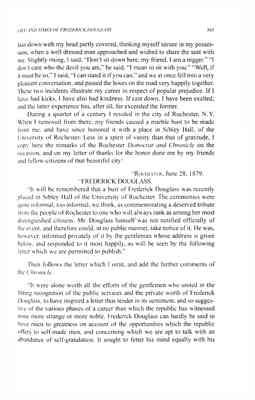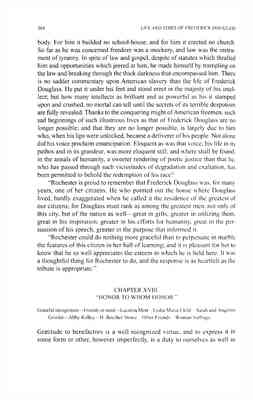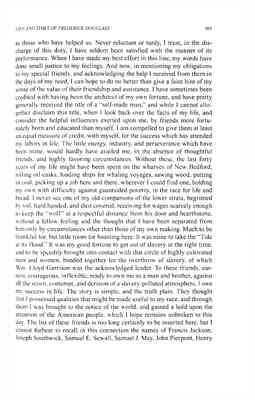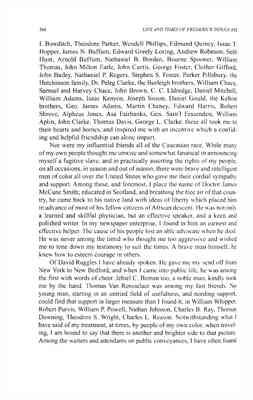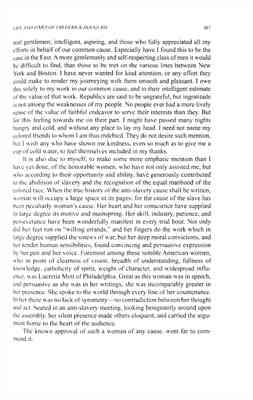Pages
211
LIFE AND TIMES OF FREDERICK DOUGLASS 363
lain down with my head partly covered, thinking myself secure in my possession, when a well dressed man approached and wished to share the seat with me. Slightly rising, I said, "Don't sit down here, my friend, I am a nigger." "I don't care who the devil you are," he said, "I mean to sit with you." "Well, if it must be so," I said, "I can stand it if you can," and we at once fell into a very pleasant conversation, and passed the hours on the road very happily together. These two incidents illustrate my career in respect o popular prejudice. If I have had kicks, I have also had kindness. If cast down, I have been exalted; and the latter experience has, after all, far exceeded the former.
During a quarter of a century I resided in the city o Rochester, N. Y. When I removed from there, my friends caused a marble bust to be made from me, and have since honored it with a place in Sibley Hall, of the University of Rochester. Less in a spirit of vanity than that of gratitude, copy here the remarks of the Rochester Democrat and Chronicle on the occasion, and on my letter of thanks for the honor done me by my friends and fellow-citizens of that beautiful city:
"ROCHESTER, June 28, 1879. "FREDERICK DOUGLASS. "It will be remembered that a bust of Frederick Douglass was recently placed in Sibley Hall of the University of Rochester. The ceremonies were quite informal, too informal, we think, as commemorating a deserved tribute from the people of Rochester to one who will always rank as among her most distinguished citizens. Mr. Douglass himself was not notified officially of the event, and therefore could, in no public manner, take notice of it. He was, however, informed privately of it by the gentleman whose address is given below, and responded to it most happily, as will be seen by the following letter which we are permitted to publish."
Then follows the letter which I omit, and add the further comments of the Chronicle
"It were alone worth all the efforts of the gentlemen who united in the fitting recognition of the public services and the private worth of Frederick Douglass, to have inspired a letter thus tender in its sentiment, and so suggestive of the various phases of a career than which the republic has witnessed none more strange or more noble. Frederick Douglass can hardly be said to have risen to greatness on account of the opportunities which the republic offers to self-made men, and concerning which we are apt to talk with an abundance of self-gratulation. It sought to fetter his mind equally with his
212
LIFE AND TIMES OF FREDERICK DOUGLASS
364
body. For him it builded no school-house, and for him it erected no church. So far as he was concerned freedom was a mockery, and law was the instrument of tyranny. In spite of law and gospel, despite of statutes which thralled him and opportunities which jeered at him, he made himself by trampling on the law and breaking through the thick darkness that encompassed him. There is no sadder commentary upon American slavery than the life of Frederick Douglass. He put it under his feet and stood erect in the majesty of his intellect; but how many intellects as brilliant and as powerful as his it stamped upon and crushed, no mortal can tell until the secrets of its terrible despotism are fully revealed. Thanks to the conquering might of American freemen, such sad beginnings of such illustrious lives as that of Frederick Douglass are no longer possible; and that they are no longer possible, is largely due to him who, when his lips were unlocked, became a deliverer of his people. Not alone did his voice proclaim emancipation. Eloquent as was that voice, his life in its pathos and in its grandeur, was more eloquent still; and where shall be found, in the annals of humanity, a sweeter rendering of poetic justice than that he, who has passed through such vicissitudes of degradation and exaltation, has been permitted to behold the redemption of his race?
"Rochester is proud to remember that Frederick Douglass was, for many years, one of her citizens. He who pointed out the house where Douglass lived, hardly exaggerated when he called it the residence of the greatest of our citizens; for Douglass must rank as among the greatest men, not only of this city, but of the nation as well—great in gilts, greater in utilizing them, great in his inspiration, greater in his efforts for humanity, great in the persuasion of his speech, greater in the purpose that informed it.
"Rochester could do nothing more graceful than to perpetuate in marble the features of this citizen in her hall of learning; and it is pleasant for her to know that he so well appreciates the esteem in which he is held here. It was a thoughtful thing for Rochester to do, and the response is as heartfelt as the tribute is appropriate."
CHAPTER XVIII. "HONOR TO WHOM IIONOR.'"
Grateful recognition—Friends in need—Lucretia, Mott Lydia Maria Child Sarah and Angelina
Grimké—Abby Kelley—H. Beecher Stowe Other Friends Woman Suffrage.
Gratitude to benefactors is a well recognized virtue, and to express it in some form or other, however imperfectly, is a duty to ourselves as well as
213
LIFE AND TIMES OF FREDERICK DOUGLASS
365
to those who have helped us. Never reluctant or tardy, I trust, in the discharge of this duty, I have seldom been satisfied with the manner of its performance. When I have made my best effort in this line, my words have done small justice to my feelings. And now, in mentioning my obligations to my special friends, and acknowledging the help I received from them in the days of my need, I can hope to do no better than give a faint hint of my sense of the value of their friendship and assistance. I have sometimes been credited with having been the architect of my own fortune, and have pretty generally received the title of a "self-made man;" and while I cannot altogether disclaim this title, when I look back over the facts of my life, and consider the helpful influences exerted upon me, by friends more fortunately born and educated than myself. I am compelled to give them at least an equal measure of credit, with myself, for the success which has attended my labors in life. The little energy, industry, and perseverance which have been mine, would hardly have availed me, in the absence of thoughtful friends, and highly favoring circumstances. Without these, the last forty years of my lite might have been spent on the wharves of New Bedford, rolling oil casks, loading ships for whaling voyages, sawing wood, putting in coal, picking up a job here and there, wherever I could find one, holding my own with difficulty against gauntsided poverty, in the race for life and bread. I never see one of my old companions of the lower strata, begrimed by toil, hard handed, and dust covered, receiving for wages scarcely enough to keep the "wolf" at a respectful distance from his door and hearthstone, without a fellow feeling and the thought that I have been separated from him only by circumstances other than those of my own making. Much to be thankful for, but little room for boasting here. It was mine to take the "Tide at its flood." It was my good fortune to get out of slavery at the right time, and to be speedily brought into contact with that circle of highly cultivated men and women, banded together for the overthrow of slavery, of which Wm. Lloyd Garrison was the acknowledged leader. To these friends , earnest, courageous, inflexible, ready to own me as a man and brother, against all the scorn, contempt, and derision of a slavery-polluted atmosphere, I owe my success in life. The story is simple, and the truth plain. They thought that I possessed qualities that might be made useful to my race, and through them I was brought to the notice of the world, and gained a hold upon the attention of the American people, which I hope remains unbroken to this day. The list of these friends is too long certainly to be inserted here, but I cannot forbear to recall in this connection the names of Francis Jackson, Joseph Southwick, Samuel E. Sewall, Samuel J. May, John Pierpont, Henry
214
366
LIFE AND TIMES OF FREDERICK DOUGLASS
I, Bowditch, Theodore Parker, Wendell Phillips, Edmund Quincy, Isaac T. Hopper, James N. Buffum, Edward Greely Loring, Andrew Robeson, Seth Hunt, Arnold Buffum, Nathaniel B. Borden, Bourne Spooner, William Thomas, John Milton Earle, John Curtis, George Foster, Clother Gifford, John Bailey, Nathaniel P. Rogers, Stephen S. Foster, Parker Pillsbury, the Hutchinson family, Dr. Peleg Clarke, the Burleigh brothers, William Chace, Samuel and Harvey Chace, John Brown, C. C. Eldredge, Daniel Mitchell, William Adams, Isaac Kenyon, Joseph Sisson, Daniel Gould, the Kelton brothers, Geo. James Adams, Martin Cheney, Edward Harris, Robert Shrove, Alpheus Jones, Asa Fairbanks, Gen. Sam'l Fessenden, William Aplin, John Clarke, Thomas Davis, George L. Clarke; these all took me to their hearts and homes, and inspired me with an incentive which a confiding and helpful friendship can alone impart.
Nor were my influential friends all of the Caucasian race. While many of my own people thought me unwise and somewhat fanatical in announcing myself a fugitive slave, and in practically asserting the rights of my people, on all occasions, in season and out of season, there were brave and intelligent men of color all over the United States who gave me their cordial sympathy and support. Among these, and foremost, I place the name of Doctor James McCune Smith; educated in Scotland, and breathing the free air of that country, he came back to his native land with ideas of liberty which placed him in advance of most of his fellow citizens of African descent. He was not only a learned and skillful physician, but an effective speaker, and a keen and polished writer. In my newspaper enterprise, I found in him an earnest and effective helper. The cause of his people lost an able advocate when he died. He was never among the timid who thought me too aggressive and wished me to tone down my testimony to suit the times. A brave man himself, he knew how to esteem courage in others.
Of David Ruggles I have already spoken. He gave me my send off from New York to New Bedford, and when I came into public life, he was among the first with words of cheer. Jehiel C. Beman too, a noble man, kindly took me by the hand. Thomas Van Rensselaer was among my fast friends. No young man, starting in an untried field of usefulness, and needing support, could find that support in larger measure than I found it, in William Whipper. Robert Purvis, William P. Powell , Nathan Johnson, Charles B. Ray, Thomas Downing, Theodore S. Wright, Charles L. Reason. Notwithstanding what I have said of my treatment, at times, by people of my own color, when traveling, I am bound to say that there is another and brighter side to that picture. Among the waiters and attendants on public conveyances, I have often found
215
LIFE AND TIMES OF FREDERICK DOUGLASS
367
real gentlemen; intelligent, aspiring, and those who fully appreciated all my efforts in behalf of our common cause. Especially have I found this to be the case in the East. A more gentlemanly and self-respecting class of men it would be difficult to find, than those to be met on the various lines between New York and Boston. I have never wanted for kind attention, or any effort they could make to render my journeying with them smooth and pleasant. I owe this solely to my work in our common cause, and to their intelligent estimate of the value of that work. Republics are said to be ungrateful, but ingratitude is not among the weaknesses of my people. No people ever had a more lively sense of the value of faithful endeavor to serve their interests than they. But for this feeling towards me on their part, I might have passed many nights hungry and cold, and without any place to lay my head. I need not name my colored friends to whom I am thus indebted. They do not desire such mention, but I wish any who have shown me kindness, even so much as to give me a cup of cold water, to feel themselves included in my thanks.
It is also due to myself, to make some more emphatic mention than I have yet done, of the honorable women, who have not only assisted me, but who according to their opportunity and ability, have generously contributed to the abolition of slavery and the recognition of the equal manhood of the colored race. When the true history of the anti-slavery cause shall be written, woman will occupy a large space in its pages; for the cause of the slave has been peculiarly woman's cause. Her heart and her conscience have supplied in large degree its motive and mainspring. Her skill, industry, patience, and perseverance have been wonderfully manifest in every trial hour. Not only did her feet run on "'willing errands," and her fingers do the work which in large degree supplied the sinews of war, but her deep moral convictions, and her tender human sensibilities, found convincing and persuasive expression by her pen and her voice. Foremost among these notable American women, who in point of clearness of vision, breadth of understanding, fullness of knowledge, catholicity of spirit, weight of character, and widespread influence, was Lucretia Mott of Philadelphia. Great as this woman was in speech, and persuasive as she was in her writings, she was incomparably greater in her presence. She spoke to the world through every line of her countenance. In her there was no lack of symmetry—no contradiction between her thought and act. Seated in an anti-slavery meeting, looking benignantly around upon the assembly, her silent presence made others eloquent, and carried the argument home to the heart of the audience.
The known approval of such a woman of any cause, went far to commend it.
